A coalition of 20 Haitian civil society groups, visiting Geneva for the U.N. Permanent Forum on People of African Descent (PFPAD), argued on Thursday that France should pay at least $150 billion in reparations to Haiti for slavery and its aftermath.
The Haitian groups arrived at this amount by taking reparations France collected from Haiti after it became the first Caribbean nation to revolt and win its independence in 1804 and adding 200 years of accrued interest.
“It’s $21 billion plus 200 years of interest that France has enjoyed, so we’re talking more like $150 billion, $200 billion or more,” University of British Columbia professor Jemima Pierre explained to Reuters on Thursday.
The Haitian Revolution began in 1791 and lasted until 1804, featuring a series of battles between the local population — which, by that point, included a large number of imported African slaves — and French colonial forces, mixed with scuffles between various groups within Haiti’s fractious society. Spanish colonial forces on the far side of the island of Hispaniola — who would eventually establish the Dominican Republic — and British forces from Jamaica further stirred the pot.
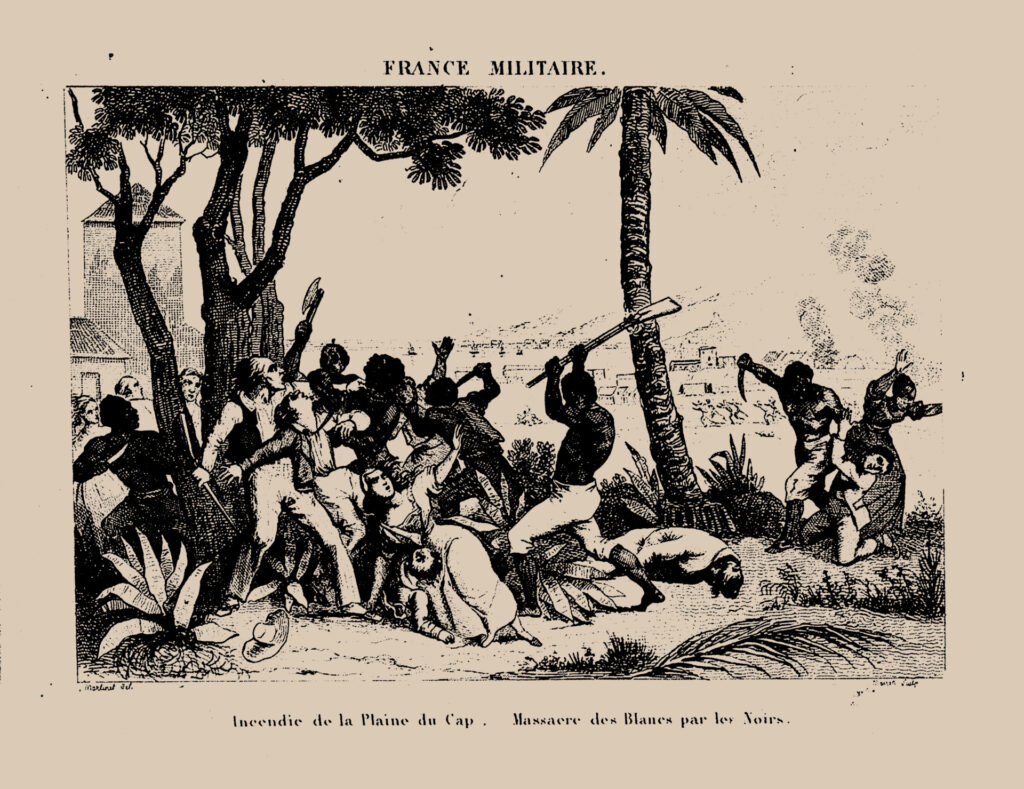
The Haitian Revolution slave rebellion on the night of August 21, 1791. (Photo by Fine Art Images/Heritage Images/Getty Images)
Eager to rally enough manpower to defeat all other parties and retain control of Haiti, the French began offering citizenship to faithful supporters and effectively abolished slavery in 1794, but Haitian militias kept fighting the French until they gave up the struggle for control, in part because France’s Emperor Napoleon Bonaparte needed his troops elsewhere. Haitian independence was declared on January 1, 1804.
France did not formally recognize Haiti’s independence until 1825, and it exacted a steep price for recognition: a payment of about 150 million francs, known as the “indemnity.” The payment was supposed to compensate French colonists for their losses when the slaves revolted and won Haitian independence.
France’s king at the time, Charles X, was considering invading and re-conquering Haiti. He sent an impressive war fleet to collect Haitian leader Jean-Pierre Boyer’s signature on the indemnity contract, and Boyer decided he had little choice but to sign it even though no one, including Charles X, believed Haiti could come up with the indicated sum. One hundred and fifty million francs was ten times Haiti’s annual government budget at the time and ten times what the United States paid for the Louisiana Purchase.
Haiti ended up borrowing 30 million francs from French banks to make the first indemnity payments and later defaulted on those loans. France reduced the balance due to 60 million francs — the document granting this discount was called the “Treaty of Friendship,” which was really rubbing it in — and then forced Haiti to take out more huge loans to pay the reparations. France ended up collecting about 90 million francs, which was five times its national budget.
University of Virginia Professor of African Diaspora Studies Marlene Daut dubbed Haiti’s indemnity payments “the greatest heist in history” in 2022, and it is hard to view the matter as anything less than robbery since Boyer was looking down the barrels of about five hundred cannons when he agreed to pay.
The fledgling Haitian government was looted of the funds it needed to pay for public works, education, and other vital needs, and it could scarcely have afforded those things to begin with. Daut cited estimates that Haiti did not finish paying off all the loans it took to finance the indemnity until 1947.
Advocates for Haiti say they can make a far more direct case for France profiting at Haiti’s expense, with negative impacts directly felt by the current generation of Haitians, than most reparations activists. Reparations activists, however, never stop with such supportable claims and soon begin claiming the entire world owes Haiti untold billions, including the United States.
On the other hand, as with all reparations claims, the dubious morality of penalizing French citizens today for the actions of their ancestors will come up, the business of deciding exactly how much France would owe is highly contentious, and France does not have $150 billion lying around in any event.
The current French annual budget is about $318 billion, the budget deficit is growing rapidly, and sharp cuts are on the horizon. Every time the French government tries to trim some corner of its spending, riots, strikes, and violent protests break out.
To put it mildly, if French President Emmanuel Macron announces major tax increases or cuts to domestic programs to finance huge reparations payments to Haiti, he would suffer a significant political consequence. Some analysts have crunched the numbers to argue that France’s debt could be boiled down to about $21 billion, but Macron is unlikely to accept that amount either, especially since France has already allocated millions in humanitarian aid for Haiti.

French President Emmanuel Macron (ABDULMONAM EASSA/POOL/AFP via Getty Images)
There is also the painful question of exactly who would be collecting those reparations payments, as Haiti currently lacks a functioning government, gangs are running wild in the streets, and corruption is endemic. Reparations advocates say huge cash infusions would help to resolve Haiti’s long history of violent unrest, but even vitally needed humanitarian aid donations are hard to raise when the most powerful person in the country is a rifle-toting gang lord who calls himself “Barbecue.”
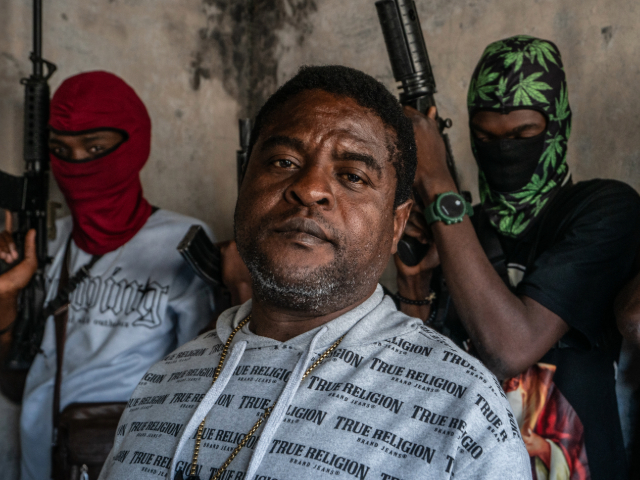
Gang leader Jimmy “Barbecue” Cherizier with G-9 federation gang members in the Delmas 3 area on February 22, 2024, in Port-au-Prince, Haiti. (Giles Clarke/Getty Images)
The Haitian civil society groups that convened in Geneva felt the newly appointed “transition council” should give Haiti enough security to get public works projects underway, but that is highly debatable since even the council members themselves worry they could be undermined by unelected Prime Minister Ariel Henry or murdered by gangsters.
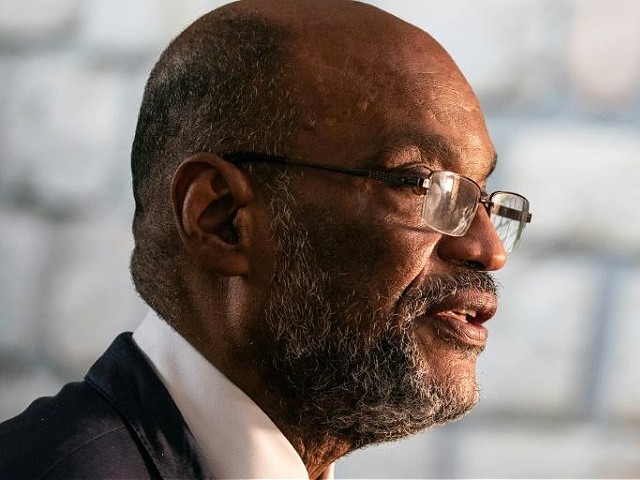
Haitian Prime Minister Ariel Henry (VALERIE BAERISWYL/AFP via Getty Images)
Haiti routinely tops lists of the most corrupt and lawless countries in the world, decade after decade. Correcting that state of affairs is more urgent than deciding who to blame for it, but no one — not the U.N. the United States, France, or other Caribbean nations — is eager to invest the level of force that would be needed to restore order, and Haitians probably would not welcome that sort of assistance if it were offered.
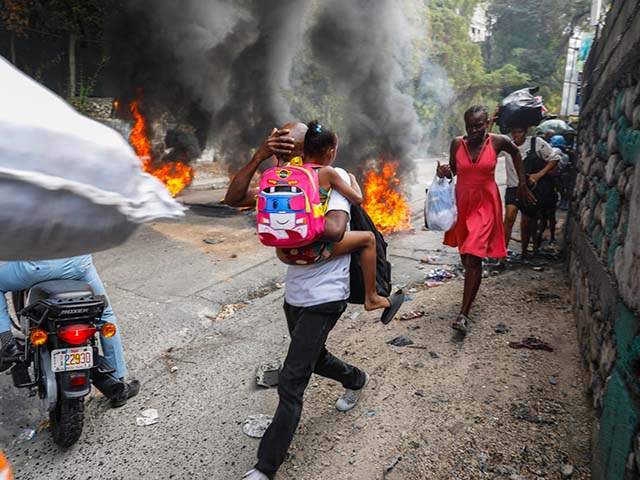
People walk past burning tires during a protest against Haitian Prime Minister Ariel Henry in Port-au-Prince, Haiti, on February 5, 2024. (AP Photo/Odelyn Joseph)
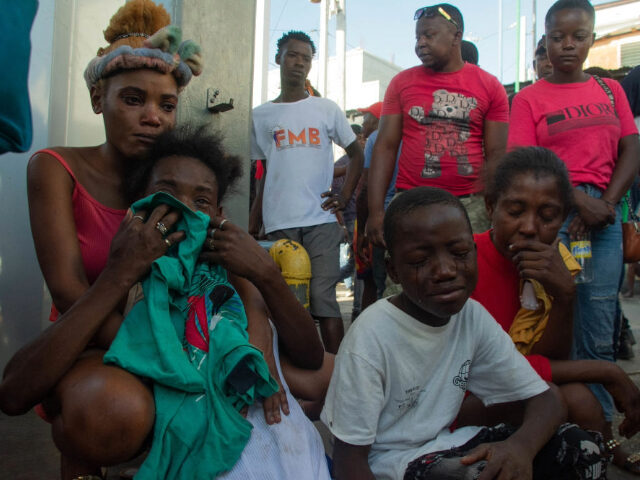


COMMENTS
Please let us know if you're having issues with commenting.